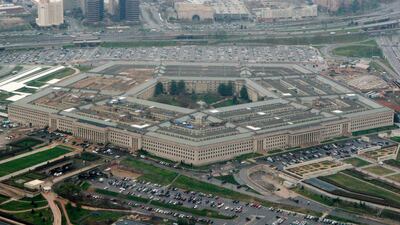A senior Israeli delegation is due to arrive in Washington on Monday for talks on matters including opposition to the US returning to the nuclear deal with Iran and recent attacks on Iranian targets, which have been blamed on Israel.
The delegation will include Mossad chief Yosef Cohen, head of military intelligence Tamir Hayman, and National Security Adviser Meir Ben-Shabbat, Israeli media reported.
The Chief of Staff of the Israeli Army, Aviv Kohavi, will no longer be joining the delegation after a recent increase in tension between Hamas and Israel.
More than 40 rockets have been fired from Gaza into Israel in the past two days and could draw the Israeli military into an operation.
The visiting delegation is expected to meet US National Security Adviser Jake Sullivan, Chairman of the Joint Chiefs of Staff Mark Milley and senior US military and intelligence officials, a diplomatic source told The National.
The head of US Central Command, Gen Kenneth McKenzie, will also meet the Israeli team.
In January, the Pentagon moved Israel into Centcom's area of command.
But the primary goal is to lodge Israel’s objections to the US returning to the nuclear deal with Iran, Israeli reports say.
The administration of US President Joe Biden has been in indirect talks with Iran in Vienna to enable a return to the 2015 deal, from which former president Donald Trump withdrew in 2018.
That would mean sanctions relief for Tehran in return for its compliance with the deal.
One Israeli official told The Times of Israel that the delegation would say a return to the deal is dangerous for the region and the US should not negotiate.
But the Biden administration has given no indication that it will change its policies because of Israel’s objections.
White House press secretary Jen Psaki on Friday said the White House would not be swayed.
Ms Psaki said the indirect negotiations between the US and Iran were continuing in a bid to find "a potential diplomatic path" for a nuclear deal, known as the JCPOA.
She said the US remained encouraged by the talks.
"As it relates to Israel, we have kept them abreast as a key partner of these discussions, or of our intentions, and we will continue to do that on any future visits," Ms Psaki said.
Randa Slim, director of the Conflict Resolution and Track II Dialogues Programme at the Middle East Institute, said the White House and the State Department were determined to return to the nuclear agreement.
"I don't think they can be swayed," Ms Slim told The National.
“President Biden and his team, especially his NSA, believe the Iranian nuclear file is the only regional file that deserves urgent action."
She said Mr Biden believed that without action, it could have serious regional consequences and divert US attention and resources away from domestic priorities, and from the strategic competition with China and Russia.
Richard Goldberg, a former White House official and a senior adviser at the Foundation for Defence of Democracies, also saw no likelihood of Israel changing the administration's position on the deal.
But Mr Goldberg said Israel could seek to maintain its military action against Iran’s activities.
"When President Biden took office, I think US allies in Israel and the Gulf believed there could be opportunities to find common ground with the new administration," he said.
They included keeping terrorism sanctions on Iran, demanding answers from Tehran on its undeclared nuclear activity before lifting any sanctions, and continued co-ordination to pull back the Islamic Revolutionary Guard Corps throughout the region.
“[Now] it's become apparent that the Biden administration will rejoin the JCPOA no matter what.”
Mr Goldberg feared the consequences of lifting terror-related sanctions to bring Tehran back to the agreement.
The Biden administration said last week it was willing to ease sanctions related to Iran’s oil and finance sectors.
“The question for Israel now is whether the US will do anything to inhibit its freedom of action in the region – in Syria, Iraq, the Red Sea and beyond,” Mr Goldberg said.
This month, the US warned Israel that the “chatter” on its alleged involvement in the Natanz nuclear site attack was “dangerous and detrimental”, Channel 12 reported.
At the weekend, an Iranian tanker was attacked off Syria's Baniyas coast and two weeks before that, an Iranian naval ship in the Red Sea was damaged by a limpet mine.


